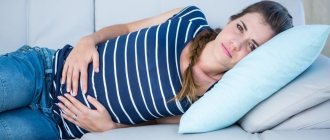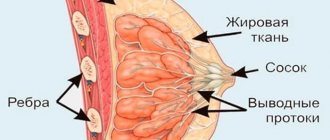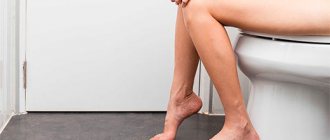Diarrhea before menstruation: physiological causes
At different phases of the cycle, the hormonal system of the female body loses stability. For example, in the first half of the MC the amount of estrogen predominates, and in the second half progesterone dominates. Gastrointestinal symptoms that precede menstrual bleeding are explained by hormonal fluctuations. Hormone imbalance affects the functioning of all organs and systems, and the digestive tract responds to changes with intestinal upset and flatulence.
If we consider diarrhea before menstruation as a sign of PMS, its causes will be physiological. As experts say, these are the individual characteristics of the body. Why does diarrhea occur:
- Hormonal imbalance.
- IBS – irritable bowel syndrome.
- Unstable uterine tone.
- Incorrect reflexes of the digestive system.
- Too high progesterone levels on the eve of menstruation.
After the egg has left the follicle, the reproductive system begins to prepare for pregnancy. At the same time, the vaginal muscles relax, and the tubal and uterine muscles increase their tone. Intestinal motility increases due to the close proximity to the uterus.
Before menstruation, fluids are not completely absorbed by the intestines, and digestive processes are disrupted. While waiting for the next bleeding, a woman is worried about bloating, colic, and diarrhea. Diarrhea also occurs due to the fact that before menstruation, appetite usually increases. The body does not have time to properly process excess food, so trips to the toilet become more frequent.
Irritable bowel syndrome, even if there is no history of this, manifests itself in gastroenterologically healthy women just before the onset of menstruation. The cause of IBS in this case is a reflex indigestion, which is associated with several factors:
- Hormone.
- Nutritional (change of eating habits).
- Reflex.
In addition to diarrhea, IBS also manifests itself with other unpleasant symptoms - pain and a feeling of heaviness in the abdomen, flatulence, nausea, vomiting, and frequent urination.
With successful fertilization of the egg, the concentration of progesterone remains at a high level, since the hormone helps preserve the nascent life. Thus, loose stools before menstruation may be a sign of pregnancy, but physiological bleeding never begins. Defecation disorder bothers the expectant mother for up to 10 days.
Pathological causes of premenstrual diarrhea
If there is a delay of several days in menstruation, while the pregnancy test is negative and intense diarrhea is bothering you, the complex of symptoms indicates poisoning or an exacerbation of a chronic disease.
The causes of pathological diarrhea on the eve of menstruation will be as follows:
- Poisoning with poor quality food, drug or chemical intoxication. Diarrhea is accompanied by nausea and vomiting.
- Exacerbation of pancreatitis. In the chronic course of the disease, the patient is bothered by symptoms of intoxication and girdle pain.
- Attacks of gastritis. Loose stools are accompanied by severe pain in the stomach.
- Nervous system disorder. Diarrhea is of psychogenic origin.
- Sudden manifestation of gastrointestinal pathologies - enteritis, gastritis, appendicitis, pancreatitis, intestinal flu, acute intestinal infection (AIE).
- Enzyme deficiency.
- Intestinal obstruction.
- Pathologies in the genitourinary part of the body.
With such symptoms, you should contact a gastroenterologist, infectious disease specialist or therapist. Self-medication is unacceptable. You should immediately visit the clinic or call a doctor at home if additional symptoms are observed:
- Frequent vomiting.
- Blood pressure surges.
- Nagging pain in the lower abdomen.
- Swelling of the face and/or limbs.
- Significant deterioration in general health.
- Unpleasant odor and foamy consistency of feces.
- Dehydration (manifested by dry mouth, increased need to drink, dizziness, weakness).
In teenage girls, diarrhea before menstruation during menarche can be both a physiological phenomenon and a sign of gastroenteritis. During hormonal changes, mothers should pay attention to the well-being of their daughters during menstrual periods and consult a doctor if the course of the first menstruation is unusual.
Diarrhea before menstruation: treatment and prevention
Intestinal infections and diseases of the digestive tract are treated in a hospital setting, since prolonged diarrhea removes moisture from the body, which can lead to dehydration. To promptly prevent the development of this dangerous condition, the patient must be under medical supervision.
If the episode of diarrhea was a one-time occurrence, you can do without treatment. It is undesirable to take medications, otherwise, instead of a binding effect, they will provoke an increase in loose bowel movements. To restore the functions of the gastrointestinal tract, if diarrhea is bothering you before menstruation, a diet will help a woman:
- Cheese.
- Slimy porridge (rice produces a lot of gluten).
- Kissel.
- Pears.
- Bananas.
- Persimmon.
- Baked goods made from wholemeal flour.
- Drink plenty of fluids.
Dairy products, carbonated drinks, everything fatty, smoked, spicy and fried are excluded from the diet. Avoid foods that cause flatulence - beans, mushrooms, radishes, cabbage, and onions. Eat often and in small portions. To relieve severe abdominal pain, take No-shpa.
The diet improves bowel function in 1–2 days. Eating light food makes you feel better and helps you lose a few pounds.
To maintain intestinal health, it is useful to eat baked pears, drink pear decoctions, berry fruit drinks, compotes, and alkaline mineral water. Anti-diarrhea medications are taken in consultation with your doctor. Activated carbon, Mezim, Pancreatin, Creon are suitable for the situation under consideration. Folk remedies include decoctions of chamomile, St. John's wort, oak bark, and yarrow.
How to get diarrhea under control
To get rid of diarrhea, choose foods rich in starch - rice, potatoes. Try taking over-the-counter pain relievers such as Ibuprofen. They will help reduce the release of prostaglandins (hormone-like compounds that are associated with pain and diarrhea).
Keep a food diary. If you notice that eating dairy products, sweets, and salty foods before the onset of menstruation leads to bloating and diarrhea - here is your answer.
Many people take Imodium for loose stools, but this medication is only suitable for frequent or severe diarrhea. Chronic use of an antidiarrheal drug will lead to intestinal dysfunction. Instead of diarrhea, you will get constipation, which is also unpleasant. Try better methods of treating diarrhea without using pills.
Drink plenty of fluids
One of the biggest problems with diarrhea that brings many people to the emergency room is dehydration. Diarrhea causes the body to lose a lot of water and electrolytes (such as sodium, potassium, calcium, magnesium) that it needs to function properly. If not treated correctly, dehydration can become dangerous.
To combat a mild bout of diarrhea, drink plenty of water, clear juices, broths, or electrolyte-rich sports drinks.
Avoid coffee, caffeinated drinks, prunes, sugary drinks, carbonated drinks, alcohol, which all have a laxative effect. It's also a good idea to avoid dairy products temporarily.
Make rehydration drinks using salt, sugar, water. You can also purchase oral rehydration salts without a prescription at most pharmacies. Follow cooking instructions as too much salt can be harmful.
Try the BRAT diet
BRUT is a diet to relieve digestive distress. The diet consists of four soft, low-fiber foods that will help strengthen the stool: bananas, rice, applesauce, toast. Bananas are especially beneficial as they help restore potassium lost due to diarrhea. Next, you can add easy-to-digest foods including baked skinless chicken breasts, oatmeal, baked potatoes, and chicken soup.
Avoid foods that cause gas, such as soda, beans, cucumbers, and cruciferous vegetables.
If diarrhea continues for more than two to three days, check the foods you eat. Diarrhea may be worsened by foods high in fiber (such as bran, whole grains, brown rice), as well as foods that are fatty or sweetened with sorbitol.
Use probiotics
Taking probiotics in food or supplement form will reduce bouts of diarrhea. Probiotics are live bacteria and yeasts that are beneficial to your digestive system. When you have an intestinal disorder, you lose a large number of beneficial bacteria in your stomach and intestines. Probiotics (which include the bacteria Lactobacillus and Bifidobacterium and the yeast Saccharomyces boulardii) will replace these protective microorganisms and restore normal intestinal function.
Although dairy products should be avoided during diarrhea, yogurt or kefir with live probiotic bacteria is extremely beneficial.
Other natural probiotic sources include fermented foods such as miso, kombucha, sauerkraut, aged soft cheeses, cottage cheese, green olives, sourdough bread and tempeh. Kimchi is often called a "super probiotic," but it contains hot spices that can make diarrhea worse.
The mechanism of occurrence of functional diarrhea
Diarrhea during menstruation is a subject of interest to many clinical researchers who want to understand the place and role of female sex hormones, progesterone and estrogens, in the functioning of the gastrointestinal tract.
The occurrence of intestinal disorders during the onset of menstruation is considered very common and occurs in a third of women of fertile age.
There are a number of reasons why diarrhea may occur during menstruation:
- Changes in the level of essential hormones, in particular an increase in the level of prostaglandins. As a result, the tone of smooth muscle cells located in the organ wall of the intestine increases, which entails an acceleration of the movement of feces to the rectum.
- The flow of a large amount of blood into the organs of the reproductive system during menstruation, as a result of which the tone of the muscular wall of the uterus, which is adjacent to the rectum, increases, affecting its peristalsis.
- A general increase in metabolism, leading to accelerated fecal formation.
- Hyperfunction of reflex regulation by the vagus nerve. It is manifested by a decrease in blood pressure, increased sweating, chills in the fingers, as well as accelerated bowel function, which leads to the appearance of loose stools.
- Changing taste preferences. Some women begin to consume foods or combinations of foods that can cause digestive system dysfunction.
It's important to remember that minor intestinal upset may even be beneficial. Along with loose stools, toxins are also removed from the body, that is, a kind of cleansing occurs. Accordingly, if diarrhea is not severe and lasts 2-3 days, then the reasons for its occurrence are physiological . Therefore, this manifestation does not require treatment.
Changing food habits
Critical days can be real “stress” for the stomach and intestines for another reason. Many women may experience changes in food preferences during this period, resulting in diarrhea caused by:
- Excessive eating. Increased appetite during menstruation is not uncommon, and not all women control it: many of them try to somehow pamper themselves, which is why they prefer unhealthy food to healthy ones, eat more than usual or mix incompatible foods that provoke irritability of the intestinal walls and diarrhea .
- Sugar. Excessive consumption of sweets entails stimulation of processes such as fermentation, bloating and flatulence. If, in addition to foods containing large amounts of sugar, a girl drinks a lot of water, then the stool acquires a liquid consistency, and by the time her period begins, diarrhea begins.
- Fried, fatty and spicy. A reaction similar to a “sugar riot” can be expected from the intestines when eating foods fried with a lot of oil or seasoned with hot spices (for example, chili pepper).
How does this relate to menstruation?
Diarrhea during menstruation is the result of physiological processes occurring in the female body during menstruation. During this period, if fertilization of the egg does not occur, it is rejected along with the functional layer of the uterus - the endometrium.
You can find out more about the structure of the endometrium in a separate article on our website.
To facilitate the evacuation of gametes and endometrial particles, microcontractions occur in the uterus, which can be transmitted to the rectum, because the organs in the pelvis are practically adjacent to each other.
Diarrhea during menstruation can also be a consequence of the fact that the changes that occur in the female body during the menstrual cycle require good nutrition for the organs of the reproductive system. This is expressed in increased blood supply to the pelvic organs. In this regard, the uterus increases in volume, and physiological swelling occurs. The enlarged uterus begins to put pressure on the wall of the rectum, irritating it and causing bowel movements.
When answering the question of why diarrhea occurs before menstruation, it is worth paying attention to factors associated with a woman’s hormonal levels during her menstrual periods. During the period under review, the levels of estrogen, progesterone and prostaglandins increase. And if the first of them is responsible for the rejection of the functional uterine layer, then progesterone is responsible for increasing the size of the uterus and relaxing its muscles. This leads to a mechanical effect on the rectum, which is enhanced by prostaglandins, irritating the muscular wall of the intestine itself, which leads to the urge to defecate.
In addition, prostaglandins, being pain mediators, are responsible for the fact that on the eve or on the first day of menstruation, women develop pain in the groin area of the abdomen.
Despite the discomfort, there is no need to worry about diarrhea caused by these reasons. You should take a closer look at your body if diarrhea is accompanied by nausea or does not go away after the end of your menstrual period.
The influence of hormones on intestinal health
As mentioned earlier, the cause of diarrhea during menstruation may be a change in hormonal levels. The second phase of the menstrual cycle (after ovulation) is a period when the concentration of progesterone in a woman’s body rapidly increases, and the level of prostaglandins also increases. These hormones are responsible for the muscles of the bladder, intestines and uterus, so to help the female reproductive organs expel bloody discharge, they reduce the tone of the muscles of all organs located near the uterus. As a result, you may experience more frequent urination or diarrhea.
Please note that hormonal changes and disruptions should not occur regularly, otherwise this may indicate the development of a serious gynecological disease.
When is diarrhea considered pathological?
Diarrhea during menstruation is not considered dangerous. However, if it lasts more than three days, you should start to worry, especially if the symptom does not go away on its own with the end of menstruation.
The following signs may indicate that diarrhea is not physiological in nature, but is a consequence of an intestinal disorder:
- the appearance of pain in the gastric region, usually of an acute nature;
- Gastrointestinal symptoms: diarrhea, nausea, vomiting;
- dark-colored stools in which mucus, traces of blood and other uncharacteristic components appear;
- change in stool odor.
These manifestations may indicate the presence of an acute intestinal infection. In case of infection, another characteristic sign will be the development of fever.
If you have such symptoms, you should immediately consult a doctor, since intestinal infections are very dangerous diseases with serious complications. As a rule, they require hospital treatment and strict anti-epidemiological measures.
Diarrhea is a symptom of many diseases associated with the gastrointestinal tract and urogenital system. Such pathologies include:
- Inflammation of the small and large intestines (enteritis and colitis). These are chronic diseases, one of the manifestations of which in the acute period is diarrhea.
- Cystitis is inflammation of the bladder. The exacerbation of the disease is provoked by critical days. As a result, a cascade contraction of the bladder muscle occurs, then the uterus, and then the rectum. As a result, cases of diarrhea are common.
- Endometriosis. Due to the growth of the functional layer of the uterine mucosa, they irritately penetrate into the wall of the rectum. This pathological condition is accompanied by diarrhea and paroxysmal pain. Particles of mucus and blood may be found in the stool.
Why does diarrhea occur during menstruation is a question that interests a large number of girls. Diarrhea is often the first symptom of approaching menstruation. On such days, diarrhea does not require treatment; it goes away on its own in the same way as it occurs. This is precisely the main problem, since getting rid of diarrhea during menstruation using medication can sometimes be very difficult.
Some women experience diarrhea only on the first day of their period, while others experience diarrhea throughout their entire period. There can be many reasons for this manifestation, which is why many women are interested in why diarrhea occurs during menstruation, and whether it is normal.
The effect of stress on diarrhea
Serious nervous disorders can affect the functioning of all human organs, and the gastrointestinal tract is no exception. As you know, during menstruation, women are characterized by sudden changes in mood, and if a serious stressful situation also occurs during this period, it is likely that the body may react with the occurrence of loose stools. In most cases, diarrhea is the result of psychological experiences and is observed on the first day of menstruation. Please note that the diarrhea will stop immediately after the woman calms down: this is the most important sign that the disorder is psychosomatic in nature. The following symptoms may occur:
- urges are observed immediately after eating or during eating;
- bloating causes discomfort;
- headache;
- pain below or to the side of the navel;
- signs characteristic of a nervous disorder (“lump” in the throat, trembling in the body, numbness of the arms and legs, intermittent breathing, etc.).
From a physiological point of view, this reaction is explained by the production of adrenaline and other chemicals, characteristic of any stressful situations, as a result of which the peristalsis of the intestinal walls accelerates, and the person suffers from loose stools. If the cause of a malfunction in the gastrointestinal tract is precisely a nervous disorder, the simultaneous appearance of bloody discharge and liquid bowel movements is more likely a coincidence than an interdependence.
Causes of diarrhea during menstruation
Intestinal upset is always combined with loose stools. In this case, loose stools become a consequence of infections and inflammations in the body. Diarrhea during menstruation is different in that it is not accompanied by high fever. However, other characteristic features may be present, such as:
- discomfort in the stomach;
- headache;
- nausea.
Diarrhea during menstruation occurs due to contractions of the uterine walls. Such movements extend to nearby organs, including the intestines. Under the influence of this activity, diarrhea begins. In this case, diarrhea is combined with pain in the lower abdomen. Also, diarrhea during menstruation can be caused by other factors:
- Diarrhea before menstruation can occur due to an increase in the level of the hormone prostaglandin, which can affect all organs and systems in the body. The peculiarity of this enzyme is that it has a relaxing effect on the intestinal muscle tissue.
- Diarrhea during menstruation can also appear under the influence of hormonal changes. During menstruation, a woman’s body strives to cleanse itself, and therefore the intestines begin to remove all harmful and toxic substances.
- Sometimes the reason why diarrhea occurs during menstruation is due to diseases of the digestive system. During menstruation, a woman’s body becomes more susceptible to external influences, and therefore diseases worsen, which causes the development of diarrhea.
- Diarrhea during menstruation is sometimes a consequence of increased blood flow to the organs of the genitourinary system and abdominal cavity. With increased load, the intestines react with disorder.
- On the first day of your period, diarrhea may appear along with severe pain in the lower abdomen and bleeding. The reason for such manifestations is the bending of the uterus. The problem goes away on its own after childbirth, as the woman’s hips expand and the uterus returns to its normal position.
The most common and main cause of diarrhea during menstruation is hormonal imbalances and disorders. In this case, it will not be possible to get rid of diarrhea. Efforts can only be aimed at reducing symptoms and their intensity.
Causes of indigestion
If outside of menstruation you suffer from chronic diseases of the stomach and intestines, then diarrhea before menstruation is quite understandable. At the end of the menstrual cycle, all chronic diseases worsen, which is why you feel such symptoms. If there are no diagnosed stomach problems, diarrhea is associated with three factors - food, hormones, anatomy.
Secret of Anatomy
The problem of the location of a woman’s internal organs plays a big role. Your uterus is right next to your colon. Before your period, the lining of the uterus thickens to prepare for implantation. As the uterus becomes more dense, it can put pressure on the colon and lead to various digestive problems.
Effect of hormones
There is a hormonal connection between menstruation and diarrhea. Just before your period begins, more prostaglandins are produced. These hormone-like compounds perform many functions, including stimulating the smooth muscles of the uterus to contract and remove accumulated endometrium.
A day or two before your period, the cells lining the uterus break down and release large amounts of prostaglandins to separate and remove the lining.
If the body produces more prostaglandins than it needs, a woman may experience severe cramping, causing the uterus to contract more strongly. An additional side effect of producing too many prostaglandins is that some of them can enter the bloodstream and be distributed throughout the body.
Because the intestines are lined with smooth muscle, excess prostaglandins can cause diarrhea by stimulating the colon to narrow, forcing out their contents. Excess prostaglandins can also cause headache, nausea, and vomiting.
Infection or premenstrual syndrome?
An upset stomach may occur due to an infection entering the body. In this case, the signs of an intestinal or gastric disorder are very similar to the symptoms of premenstrual syndrome. The only difference is that the signs of an infectious disease are somewhat stronger. In general, the disorder manifests itself with the following symptoms:
- loose stools, which occur quite often;
- Strong headache;
- general weakness in the body;
- high body temperature;
- nausea;
- pain in the abdominal cavity;
- vomit.
Loose stools during menstruation, combined with the listed symptoms, can only be observed with extremely severe menstruation. In other cases, you should be concerned, since such signs should be attributed to manifestations of diseases. In this case, the infection must be detected as quickly as possible so as not to cause even more severe distress and spread of the infection. You should also be concerned if diarrhea continues after your period. In this case, the color and smell of feces are of great importance. Alarming signs include streaks of blood, green and black inclusions, as well as a strong, unpleasant odor. If these signs are accompanied by severe abdominal pain, diarrhea is likely due to an exacerbation of the disease.
When to see a doctor
You should contact your doctor immediately if you have persistent or severe diarrhea, signs of dehydration, or other symptoms:
- Diarrhea persists for two to three days;
- You feel severely dehydrated;
- Worried about severe pain in the abdomen or rectum;
- Bloody or black stools appear;
- Your temperature is above 39 C.
Don't ignore persistent diarrhea. If you've tried the home remedies above and still have loose stools, call your doctor or talk to your pharmacist about over-the-counter medications to help relieve diarrhea.
Sources:
https://mamazdorova.ru/ponos-pered-mesyachnymi/ https://mencikl.ru/ponos-pered-mesyachnymi.html https://mesiki.com/menstruatsiya/ponos-pered-mesyachnymi/
Prevention measures
In order to relieve the symptoms of diarrhea during menstruation, a woman needs to follow some preventive measures. In the second half of the menstrual cycle, you should switch to a special diet. The following products must be present in the diet:
- meat broths, preferably strong;
- cottage cheese;
- strong black tea;
- buckwheat, oatmeal;
- potato;
- crackers;
- White bread.
These products have a strong strengthening effect. Feces become harder. However, you should be careful about your diet and not overload your intestines with too heavy food, otherwise constipation and intestinal obstruction may occur.
The diet also includes the temporary exclusion of certain foods from the diet. During the period before your period you should avoid the following foods:
Important! Taking medications to eliminate diarrhea during premenstrual syndrome is not recommended, as they can harm the body. It is better to use traditional recipes to relieve symptoms. For example, a decoction of chamomile, oak bark or St. John's wort can help well.
You can also swallow a few black peppercorns. To relieve pain caused by spasms in the intestines, you can use the herbal drug No-shpa.
Relief methods
In case of intestinal tract disorders, first of all, it is necessary to determine the cause of the problem. If such a reaction of the body is caused by hormonal disorders, conventional medications will not only not help, but can also provoke an equally unpleasant consequence - constipation. Is the cause of all troubles a nervous breakdown? Take homemade herbal tinctures (from chamomile, yarrow or oak bark). These medicinal plants will have a bactericidal, soothing and at the same time astringent effect on the intestines, and you will be able to quickly recover from a nervous disorder. Moreover:
- Review your diet. During menstrual bleeding and on the eve of menstruation, it is not recommended to eat fried, spicy, excessively salty or sweet foods. Temporarily avoid fruits, dairy products and other foods that cause bowel relaxation. If diarrhea has already occurred, go on a strict diet. Your menu should contain only lean dishes, for example, sugar-free applesauce, jelly, dried bread, boiled meat, steamed cutlets or low-fat kefir.
- Drink plenty of water at room temperature. Excessively hot or cold drinks also provoke intestinal irritability, so it is recommended to take only slightly warm water, as well as rosehip or nettle infusions.
The onset of menstruation and diarrhea is a very unpleasant phenomenon, but if the cause is hormonal changes, you will not be able to prevent it. Wait 2-3 days. Most likely, the diarrhea will end, and the intestines will be able to function normally as before.
Diarrhea during missed period
Delayed menstruation and diarrhea often accompany each other. It should be noted that the combination of these symptoms does not appear just like that. Diarrhea and delayed menstruation occur due to the fact that the hormonal levels in a woman’s body change significantly. All systems and organs begin to prepare for pregnancy, and therefore the ratio of hormones begins to change. An increase in progesterone in the blood has a relaxing effect on the intestines and other organs of the digestive tract.
In addition, in addition to loose stools, other signs appear, such as headache, increased breast size, apathy, increased body fatigue, drowsiness and decreased performance. Diarrhea during pregnancy can last for a couple of months.
Know! Diarrhea with a delay in menstruation is a sure sign of pregnancy.
In the future, the stool will become harder, and even constipation is observed in the last months of pregnancy. Sometimes diarrhea appears before your period is missed, in which case it is too early to talk about pregnancy. You should wait 2-3 days; if your period does not arrive on time, you need to buy a pregnancy test. Often, with diarrhea and retention, a woman’s lower back is pulled, which is also a sign of pregnancy. In the first weeks, the egg is implanted, which is why pain occurs.
What should you be concerned about?
Nausea
It should be noted that only in rare cases, diarrhea before menstruation is a symptom of diseases of the digestive system with a chronic course, such as gastritis or pancreatitis. But it is precisely this period of time that is considered favorable for the appearance of intestinal infection.
Diarrhea, which indicates pathological processes in the body, can be accompanied by a large number of other pathological manifestations and sensations. The woman will be concerned about:
- increased body temperature;
- nausea;
- excessively intense pain in the abdominal area;
- the appearance of an unpleasant odor and foamy consistency in the stool;
- prolonged vomiting.
Please note that diarrhea may also indicate pregnancy, especially if it is accompanied by a feeling of nausea, vomiting and a slight increase in body temperature (a few tenths of a degree).
Regardless of the case, diarrhea that lasts several days and is accompanied by at least one of the listed symptoms requires immediate consultation with a doctor. After all, only he will be able to assess the patient’s general condition, collect complaints and anamnesis, and, if necessary, prescribe an examination and appropriate treatment.
Diarrhea during ovulation
The occurrence of diarrhea during ovulation does not indicate a direct relationship between these phenomena. However, diarrhea may occur during ovulation as a result of irritable bowel syndrome.
This syndrome occurs due to a decrease in the distance between the egg and the intestine. As a result of increased stress on the intestines and abdominal cavity, irritation in these organs increases.
Ovulation can also cause increased contraction of the intestinal walls, which in turn causes thinning of the stool. It is not possible to get rid of diarrhea that occurs during ovulation or during premenstrual syndrome using medications.
The only thing that can be done in this case is to adjust your diet. Some traditional methods can also help. However, you should be especially careful about the symptoms of the disorder. If diarrhea continues after ovulation, especially with an increase in temperature, you should visit a doctor.
Measures are aimed at eliminating the pathological symptom
If disorders of the digestive process during the premenstrual period do not lead to the appearance of discomfort in a woman, then in this case no measures can be taken to eliminate them. If diarrhea is accompanied by nausea, then before taking any medications you need to take a pregnancy test. This need is explained by the fact that the fetus is formed in the first trimester of pregnancy (especially in the first weeks), and it is very sensitive to medications and their negative impact can cause deviations in its development.
How to treat diarrhea during menstrual periods
What to do to avoid complications? Hygiene is of great importance when dealing with diarrhea during menstruation. Bloody discharge makes the environment very moist, and when defecating, liquid stool can leak, so it is necessary to properly use sanitary napkins or toilet paper, removing dirt towards the anus. By performing such manipulations, it is possible to prevent fecal fluid from entering the vagina, thereby protecting the proliferation of E. coli in the pelvic organs. If tampons are used during menstruation for diarrhea, it is necessary to ensure that the lace is not soiled with feces, and after visiting the toilet you should wash your hands thoroughly.
If after menstruation a dependence of diarrhea on a gastrointestinal disorder can be identified, traditional methods of treatment are used:
- reception of motor regulators;
- the use of probiotics;
- antibacterial therapy;
- dehydration therapy (restoration of water-salt balance);
- following a strict diet.
Frequent urge to defecate before menstruation
While some women's periods are asymptomatic, others suffer from some discomfort. There are both natural reasons why you really want to go to the toilet during your period, as well as negative factors. The latter cause discomfort, frequent urination and problems with the gastrointestinal tract.
Frequent bowel movements during menstruation are not a deviation. Hormonal changes affect not only the muscles of the uterus. The digestive system is also directly affected. Increased muscle activity provokes cleansing of the intestines, which then puts less pressure on the uterus.
The body does this to reduce the level of sensation a woman experiences from contractions of her main sexual organ. It is most difficult when there is heavy discharge.
Minor pain is allowed when going to the toilet, but it should not lead to tears.
During menstruation, diarrhea or other gastrointestinal upset may occur due to the following:
- relaxation of the vaginal muscles;
- functional disorder of the intestine;
- the effect of increased progesterone levels;
- poor diet (lack of fiber);
- dysbacteriosis;
- stress.
These factors do not pose serious harm to women's health. The problem disappears on its own after menstruation, or after improving lifestyle and diet. With this disorder, unpleasant sensations are possible; in this case, pills for abdominal pain during menstruation will help.
There are also pathological causes of diarrhea:
- bend of the uterus;
- endometriosis;
- cystitis;
- exacerbation of digestive diseases;
- menstrual irregularities (algodysmenorrhea);
- intestinal infection.
It is menstruation that helps us understand that there is a disease that needs to be treated.
It’s not normal when during menstruation you really want to go to the toilet, and during the process you experience unbearable pain. During monthly bleeding, immunity decreases, which is why hidden health problems become more pronounced.
It is impossible to accurately determine the cause without medical help. There are several most likely provoking factors:
- Intestinal problems. Pain during bowel movements often occurs in the lower back or abdomen (near the navel).
- Hormonal imbalances. Excessive levels of oxytocin in the blood cause muscles to tighten, which is why difficulties arise when visiting the bathroom.
- Endometriosis. If the foci of the disease spread to the rectum, then menstruation becomes abundant, ends and begins with spotting. There is also severe pain with each bowel movement.
- Consequence of treatment. Many oral medications can affect the gastrointestinal tract, causing not only stomach upset, but also pain during bowel movements.
- Poisoning. Eating expired or contaminated foods or violating recipes outside of menstruation are easier to tolerate by the body than during menstruation.
Nagging or cramping pain at the beginning of the cycle can be caused by both gynecological problems and gastrointestinal disorders.
Self-medication is completely excluded, since without examination and consultation with a doctor it is impossible to select effective therapy.
In most cases, there is nothing wrong with visiting the toilet more often during your period. Rejection of the endometrium occurs against the background of a sharp decrease in the level of a woman’s sex hormones. The uterus begins to contract more intensely in order to quickly remove old cells out.
If you add swelling of this organ during menstruation, then irritation of the bladder is possible. Most of the urge to go to the toilet occurs at the beginning of the cycle, from the first day of menstruation. But if cutting pain and a burning sensation are added to this, then the cause is a disorder.
If it is painful for a girl or woman to go to the toilet during her period, she needs to be examined in a hospital. There can be many reasons for this condition. Starting from significant fluid consumption, stress, ending with serious infectious diseases:
- Cystitis. Symptoms of infectious inflammation of the bladder intensify during menstrual periods. With monthly bleeding, it is easier for bacteria to enter the organs of the reproductive system and the urethra, causing a number of unpleasant sensations. Cystitis may be indicated before, after, and during menstruation.
- Hygiene. Abuse of tampons and washing with aggressive agents causes irritation and an allergic reaction. The process of urine excretion only aggravates the situation, causing pain and burning.
- Kidneys. If there are stones in these organs, it hurts a woman to pee not only during menstruation, but also after it. Other symptoms include vomiting, nausea and fever.
- Hidden sexually transmitted infections. Due to a decrease in the body's protective functions, PPI symptoms begin to actively appear before menstruation. The nature of not only urine, but also blood changes. The discharge becomes cloudy and has an unpleasant odor.
In most situations, it is painful to go to the toilet during menstruation for women who have recently suffered from hypothermia. And you still need to contact a gynecologist and other specialists. Even minor disorders without treatment can develop into a more serious disease that will affect not only the genitals, but also other organs.
Quite often on women’s forums you can find the following complaint: “I only get my period when I go to the toilet.” Almost 30% of women face this problem, and only the end of menstruation, when the remnants of the endometrium come out, can be considered normal.
The problem may also be related to:
- with poor uterine tone;
- with abnormalities of the reproductive system organs;
- with narrowing of the cervical canal;
- with the onset of pregnancy.
The exact cause of what is happening can only be determined by ultrasound. Doctors also advise women to abandon traditional medicine until an accurate diagnosis is made.
Frequent urge to go to the toilet, pain and other discomfort may not be associated with pathology. But it is extremely important to get information from a doctor. The specialist will conduct an examination, answer the patient’s questions and prescribe the necessary treatment. Comments on forums and articles can be used for informational purposes only, otherwise self-medication will only worsen the problem with the gastrointestinal tract and bladder.
source
Every month, millions of women all over the planet feel unwell: dizziness, aching pain in the lower abdomen, bad mood. Sometimes representatives of the fair sex complain of diarrhea, which very often occurs in the first days of the menstrual cycle. Why it happens, no specialist can definitely answer without an examination.
Many gynecologists do not consider the occurrence of diarrhea in the first days of the menstrual cycle to be a cause for concern. However, if you experience a similar symptom often and are accompanied by pain, it’s time to figure out the cause of diarrhea.
Do not forget that during the menstrual period the female body produces many hormones, which in one way or another individually affect the condition, thereby controlling the renewal of the uterine mucosa. Thus, under the influence of gestagens, the uterus begins to contract, freeing itself from its inner covering. Thus, the answer to the question - why intestinal upset occurs during menstruation can be:
- The manifestation of premenstrual syndrome is based on hormonal problems that can manifest themselves even before the onset of menstruation. There are many manifestations of PMS, ranging from physical to emotional. Intestinal upset is one of the most common signs of PMS. It is worth noting that in women with MPS, menstruation is much more difficult - mood swings, migraines, dizziness, flatulence, stabbing or cutting pain in the lower abdomen may occur;
- Increased blood circulation in the pelvis is one of the characteristic features of menstruation and can occur several days before its onset. The rush of blood makes the uterus more swollen. Increased blood circulation occurs due to hormones. The cause of diarrhea is that the uterus increases in size due to swelling and begins to put pressure on the intestines, thereby causing it to contract;
- Relaxation of the smooth muscles of the uterus - without it, contraction is impossible. During uterine contractions, a full intestine can interfere with its activity. Thus, on “women’s” days, the intestines are released much better than on ordinary days due to contraction of the uterus;
- High levels of prostaglandins - these substances also help the uterus contract. But in addition to contraction, they can provoke pain. If in the first days of the menstrual cycle a woman feels noticeable pain in the lower abdomen and intestinal upset occurs, the cause of this ailment is the high level of prostaglandins in her body. In addition, the substances also affect the intestines, relaxing its smooth muscles, thereby allowing feces to be most actively excreted from the body;
- Overeating and consumption of certain foods - women often complain that shortly before the start of the cycle and in the first days, they eat much more food than on normal days and they begin to crave sweet or salty foods. The uterus and intestines are located quite close to each other. In the first days, the uterus contracts, and the overcrowded intestines can put pressure on it, which in turn provokes pain and diarrhea. Eating sweet foods causes fermentation to begin in the intestines, causing flatulence and intestinal upset. And as a result of eating salty food, a person wants to drink more, which in turn causes swelling of the internal organs, making stool liquid;
- Pregnancy – Progesterone levels increase during pregnancy. Its high levels act as a laxative on the intestines. And the increased appetite, in turn, causes overflowing of the intestines and pressure on the uterus;
- Stress - everyone knows that shortly before the onset of menstruation, a woman reacts completely differently to various situations and becomes more irritable. A psycho-emotional state can affect the body, causing diarrhea.
However, despite the above reasons for the occurrence of diarrhea, before and during menstruation, if this symptom does not go away and begins to intensify, you should definitely undergo a female examination. Similar symptoms can occur with a bent uterus, endometriosis, algodismenorrhea, etc.
If diarrhea is not caused by gynecological diseases, then exclude the following foods from your diet before menstruation:
On critical days, try to monitor your appetite, eat less and in small portions. It is best to avoid causing diarrhea and eat only freshly prepared foods. Drink more purified boiled water, but do not exceed its consumption (the norm is 2 liters per day).
If diarrhea causes you severe discomfort, try simple foods that strengthen you: buckwheat porridge, strong black tea, meat broth, oatmeal, boiled rice, cottage cheese and crackers.
The use of medications to combat intestinal disorders is strongly discouraged. Do not use Imodium or other antidiarrheals. They can cause constipation, and as a result, flatulence and cramping pain. For severe pain, you can use antispasmodics, for example, “No-shpa”, “Spazmalgon” and others. They will eliminate pain and relieve spasms in the intestines and uterus. However, their frequent use can cause bleeding.
If you have a lot of pain in your lower abdomen and you often feel the urge to have a bowel movement, an infusion of valerian or peony will be a harmless and effective remedy for you, which will not only relax the nervous system, but also the body. During menstruation, other herbal infusions are not as effective as peony or valerian.
Usually 2-3 days after the start of menstruation, diarrhea and other symptoms disappear, and the body begins to function as usual. But, if during this time the intestinal disorder does not go away, you should sound the alarm.
To get rid of unpleasant syndromes, try to sleep more, reduce mental and physical stress, and spend more time in the fresh air.
- Diarrhea lasts more than 3 days;
- After the end of menstruation, the lower abdomen hurts and is accompanied by other premenstrual symptoms;
- The stool has an unpleasant odor, contains mucus or blood, and becomes darker in color.
Pain, intestinal cramps, and diarrhea themselves are common symptoms of the onset of menstruation. Before the start of a new menstrual cycle, a woman’s body begins to secrete a lot of hormones that provoke pain in the lower abdomen, flatulence, bad mood, etc. However, if at the end of your period you still have a stomach ache, frequent bowel movements and feel other ailments, consult a doctor immediately, because this may be symptoms of an intestinal infection, cystitis, gynecological disease, or simply a sign of poor digestion.
What to do and what tests to take
In some cases, digestion returns to normal on the first day of menstruation, but sometimes women suffer from loose stool for a long period. If you regularly experience diarrhea before your period and this condition causes significant discomfort, it is best to visit a doctor.
To determine whether the malaise is related to menstruation, you should undergo an examination:
- Take a urine test.
- Donate blood for hCG in order to exclude a possible pregnancy.
- Donate feces for coprogram.
- Do an ultrasound of the pelvic organs.
- Get an X-ray or CT scan of the abdomen.
Ways to normalize the condition
No one knows how to treat diarrhea better than a doctor. Therefore, the selection of antidiarrheal medications should be coordinated with a specialist who recommends medications based on the diagnosis.
A gastroenterologist may recommend taking:
- Sorbents . Drugs in this group help relieve intoxication, which often appears due to edema, poor diet, and overeating. It helps well with diarrhea before menstruation Smecta, Enterosgel, Polysorb.
- Antispasmodics and painkillers . No-shpa, Papaverine, Drotaverine help relieve spasms of smooth muscles, not only relieving abdominal pain, but also reducing the number of urges to defecate.
- Enterobiotics . Bifidobacteria and lactobacilli contained in Linex, Bifiform and other probiotics will help stabilize the balance of intestinal microflora and restore normal stool.
Women who often suffer from loose stools before menstruation should carefully monitor the water and electrolyte balance in the body. Dehydration is the most dangerous complication caused by diarrhea. To avoid it, you need to drink jelly, compotes from dried blueberries, pear fruits, and also take pharmaceutical rehydration solutions: Gastrolit, Regidron, Normohydron.
Patients prone to nervous feelings are advised to take sedatives. You can also drink chamomile tea, a decoction of mint leaves, and lemon balm. These drinks have a calming effect and help restore normal digestion.










